
Sometimes finding a match for original siding is easier said than done. Given the scarcity of old-growth wood, sourcing lumber of the same cut and quality as the clapboards on an 18th-century dwelling can be an exercise in frustration. And no one would want to re-side a 1950s Ranch house with asbestos-cement siding, even if it were still available.
Fortunately, mills still exist that cut clapboards the old-fashioned way, out of tightly grained wood; and believe it or not, you can still find fiber-cement shingles— minus the asbestos—that are dead ringers for the ridge-textured ones found on mid-century Ranch houses. Some materials are sold in both traditional squares and as preassembled systems that make them quicker and easier to install.
Lap siding is likely the oldest form of wood cladding in our history. It’s most lumber at an angle, splitting the wood into two pieces. Each finished board tapers from thick on one side to thin at the other. (The profile produces the characteristic clapboard edge.) Better grades of lap siding are cut radially from the tree with growth rings perpendicular to the board. This yields a more consistent, vertical grain that’s superior to other forms of siding.
Bu hikaye Old House Journal dergisinin June 2020 sayısından alınmıştır.
Start your 7-day Magzter GOLD free trial to access thousands of curated premium stories, and 9,000+ magazines and newspapers.
Already a subscriber ? Giriş Yap
Bu hikaye Old House Journal dergisinin June 2020 sayısından alınmıştır.
Start your 7-day Magzter GOLD free trial to access thousands of curated premium stories, and 9,000+ magazines and newspapers.
Already a subscriber? Giriş Yap

Navigating the Lumberyard - Here's some lumber lingo you should know before you venture into a lumberyard.
Here's some lumber lingo you should know before you venture into a lumberyard. Almost everyone fixing an old house will end up at a lumberyard-whether it's a local supplier or the organized aisles of a big-box home-improvement store.

a farmhouse renewed
Sensitive renovations and restoration work preserved a house that dates to 1799.
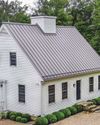
AN OVERVIEW OF METAL ROOFING
METAL ROOFS ARE RESURGENT, FOR GOOD REASONS.

ENDURING BEAUTY IN WALLS of STONE
Now back in the family who had been here since 1830, the old farmhouse is again ready for generations to come. Additions dating to 1840 and the 1950s were preserved.

ARCHITECTURAL DETAILS COME TO LIFE
Owners and their designer celebrate the unique features of a 1912 Arts & Crafts Tudor.
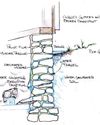
For a Wet Basement Wall
If there's problem common to old houses, it's a wet basement. I'm not talking about occasional flooding, but rather a basement that apparently seeps or leaks after even a rain shower or during snowmelt. Several approaches are available; sustainable solutions will get to the root of the problem.
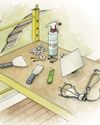
Patching a Plaster Wall
Fix a hole in the wall with a few common tools and some drywall supplies. Practice your technique!
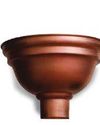
Roofing & Siding
Make note of these historical and unusual materials for the building envelope.
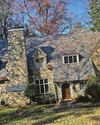
The Riddle of the water
When water incursion happens, the roof isn't necessarily the culprit. Maybe snaking a drain line, or clearing debris from a clogged gutter, temporarily will stem a leak. But a recurring problem usually means other forces are at work. It takes persistence-and a team with the right skills and patience—to identify the source and apply a solution.

Light-filled Craftsman Redo
For a dark kitchen in a 1914 Illinois house, the trick was anchoring white expanses with woodsy warmth.